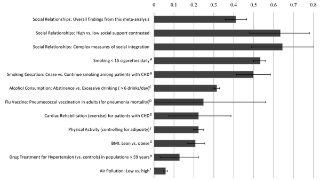So I have several studies here to show. The links to the studies are found at the end of this post
Study number 1: Not being lonely reduces your mortality rate by 50%, far exceeding many other health factors
Data across 308,849 individuals, followed for an average of 7.5 years, indicate that individuals with adequate social relationships have a 50% greater likelihood of survival compared to those with poor or insufficient social relationships. The magnitude of this effect is comparable with quitting smoking and it exceeds many well-known risk factors for mortality (e.g., obesity, physical inactivity).
The overall effect remained consistent across a number of factors, including age, sex, initial health status, follow-up period, and cause of death, suggesting that the association between social relationships and mortality may be general, and efforts to reduce risk should not be isolated to subgroups such as the elderly.
To draw a parallel, many decades ago high mortality rates were observed among infants in custodial care (i.e., orphanages), even when controlling for pre-existing health conditions and medical treatment [201]–[204]. Lack of human contact predicted mortality. The medical profession was stunned to learn that infants would die without social interaction. This single finding, so simplistic in hindsight, was responsible for changes in practice and policy that markedly decreased mortality rates in custodial care settings. Contemporary medicine could similarly benefit from acknowledging the data: Social relationships influence the health outcomes of adults.
Study number 2: Loneliness is bad for your health, increases mortality by 26% on average, going up to 48% for the top quintile of isolation
The sample size was 6500 people, all over the age of 52. (after all normies only care about the isolation of old people or just pretend like only old people suffer from that)
Study number 3: Social isolation is as powerful as other classical health factors such as high blood pressure and smoking
Sample size: Almost 17 000. More of the same, I won't be copypasting much, the graphs in the study are really nice.
Clink on the link below if you want to see cool graphs

 www.ncbi.nlm.nih.gov
www.ncbi.nlm.nih.gov
Study number 4: Social isolation is as bad as smoking 15 cigarettes per day
Unfortunately I can't find the study itself. It was supposedly conducted by the AARP and published in a journal, but the links i've found to the study give me an error. If anyone can find the study it would be cool. I do have a link to an official pdf from the AARP that mentions this fact on page 3
According to a study published last year in Perspectives on Psychological Science, the health effects of prolonged isolation are equivalent to smoking 15 cigarettes a day. [broken link]
Study number 5: Loneliness could be considered a disease based on the consequences it has on human health
Loneliness may be pathognomic of depression in old age. It is reported to be more dangerous than smoking[1]; high degree of loneliness precipitates suicidal ideation and para-suicide,[2] Alzheimer's disease, and other dementia[3,4] and adversely affects the immune and cardio-vascular system.[5] It is a generally accepted opinion that loneliness results in a decline of well-being and has an adverse effect on physical health, possibly through immunologic impairment or neuro-endocrine changes.[6] Loneliness is thus, among the latent causes of hospitalization and of placement in nursing homes.[7]
Loneliness predisposes a person to physical diseases too as it has an adverse impact on immune, cardiovascular, and endocrine system.[32] Consistent, overwhelming and pervasive loneliness develops stress and ultimately culminates into serious physical disease. Feeling of loneliness and being alone were found to be independent predictors of motor decline in old age.[33] Loneliness was also found to be an independent predictor of mortality and functional decline after controlling for depression.[34] It also leads to memory impairment and learning difficulties, and makes the person prone to Alzheimer's disease.[35] A Dutch study reports that people who feel lonely are more likely to develop clinical dementia over a period of 3 years compared to those who do not experience loneliness.[36]
Study 5 also delves into the differences between loneliness and solitude, risk factors of social isolation etc. It's a decent read. Though they quote a study that said that women are more socially isolated than men jfl. It's in india though so who knows
Links of studies 1 to 5 (4 is missing)

 journals.plos.org
journals.plos.org

 www.pnas.org
www.pnas.org

 www.ncbi.nlm.nih.gov
www.ncbi.nlm.nih.gov

 www.ncbi.nlm.nih.gov
www.ncbi.nlm.nih.gov
Study number 1: Not being lonely reduces your mortality rate by 50%, far exceeding many other health factors
Data across 308,849 individuals, followed for an average of 7.5 years, indicate that individuals with adequate social relationships have a 50% greater likelihood of survival compared to those with poor or insufficient social relationships. The magnitude of this effect is comparable with quitting smoking and it exceeds many well-known risk factors for mortality (e.g., obesity, physical inactivity).
The overall effect remained consistent across a number of factors, including age, sex, initial health status, follow-up period, and cause of death, suggesting that the association between social relationships and mortality may be general, and efforts to reduce risk should not be isolated to subgroups such as the elderly.
To draw a parallel, many decades ago high mortality rates were observed among infants in custodial care (i.e., orphanages), even when controlling for pre-existing health conditions and medical treatment [201]–[204]. Lack of human contact predicted mortality. The medical profession was stunned to learn that infants would die without social interaction. This single finding, so simplistic in hindsight, was responsible for changes in practice and policy that markedly decreased mortality rates in custodial care settings. Contemporary medicine could similarly benefit from acknowledging the data: Social relationships influence the health outcomes of adults.
Study number 2: Loneliness is bad for your health, increases mortality by 26% on average, going up to 48% for the top quintile of isolation
The sample size was 6500 people, all over the age of 52. (after all normies only care about the isolation of old people or just pretend like only old people suffer from that)
Socially isolated individuals are at increased risk for the development of cardiovascular disease (3), infectious illness (4), cognitive deterioration (5), and mortality (6⇓⇓–9). Social isolation also has been associated with elevated blood pressure, C-reactive protein, and fibrinogen (10, 11) and with heightened inflammatory and metabolic responses to stress (12, 13).
[...]
Loneliness itself has been linked with increased risk of cardiovascular disease and mortality (15⇓⇓–18), elevated blood pressure and cortisol (19⇓–21), heightened inflammatory responses to stress (22, 23), and modifications in transcriptional pathways linked with glucocorticoid and inflammatory processes (24).
after adjusting statistically for demographic factors and baseline health, social isolation remained significantly associated with mortality (hazard ratio 1.26, 95% confidence interval, 1.08–1.48 for the top quintile of isolation)
Study number 3: Social isolation is as powerful as other classical health factors such as high blood pressure and smoking
Sample size: Almost 17 000. More of the same, I won't be copypasting much, the graphs in the study are really nice.
Results. Socially isolated men and women had worse unadjusted survival curves than less socially isolated individuals. Cox models revealed that social isolation predicted mortality for both genders, as did smoking and high blood pressure.
Clink on the link below if you want to see cool graphs

Social Isolation: A Predictor of Mortality Comparable to Traditional Clinical Risk Factors
Objectives. We explored the relationship between social isolation and mortality in a nationally representative US sample and compared the predictive power of social isolation with that of traditional clinical risk factors.Methods. We used data on 16 849 ...
Study number 4: Social isolation is as bad as smoking 15 cigarettes per day
Unfortunately I can't find the study itself. It was supposedly conducted by the AARP and published in a journal, but the links i've found to the study give me an error. If anyone can find the study it would be cool. I do have a link to an official pdf from the AARP that mentions this fact on page 3
According to a study published last year in Perspectives on Psychological Science, the health effects of prolonged isolation are equivalent to smoking 15 cigarettes a day. [broken link]
Study number 5: Loneliness could be considered a disease based on the consequences it has on human health
Loneliness may be pathognomic of depression in old age. It is reported to be more dangerous than smoking[1]; high degree of loneliness precipitates suicidal ideation and para-suicide,[2] Alzheimer's disease, and other dementia[3,4] and adversely affects the immune and cardio-vascular system.[5] It is a generally accepted opinion that loneliness results in a decline of well-being and has an adverse effect on physical health, possibly through immunologic impairment or neuro-endocrine changes.[6] Loneliness is thus, among the latent causes of hospitalization and of placement in nursing homes.[7]
Loneliness predisposes a person to physical diseases too as it has an adverse impact on immune, cardiovascular, and endocrine system.[32] Consistent, overwhelming and pervasive loneliness develops stress and ultimately culminates into serious physical disease. Feeling of loneliness and being alone were found to be independent predictors of motor decline in old age.[33] Loneliness was also found to be an independent predictor of mortality and functional decline after controlling for depression.[34] It also leads to memory impairment and learning difficulties, and makes the person prone to Alzheimer's disease.[35] A Dutch study reports that people who feel lonely are more likely to develop clinical dementia over a period of 3 years compared to those who do not experience loneliness.[36]
Study 5 also delves into the differences between loneliness and solitude, risk factors of social isolation etc. It's a decent read. Though they quote a study that said that women are more socially isolated than men jfl. It's in india though so who knows
Links of studies 1 to 5 (4 is missing)
Social Relationships and Mortality Risk: A Meta-analytic Review
In a meta-analysis, Julianne Holt-Lunstad and colleagues find that individuals' social relationships have as much influence on mortality risk as other well-established risk factors for mortality, such as smoking.

Social isolation, loneliness, and all-cause mortality in older men and women
Both social isolation and loneliness are associated with increased mortality, but it is uncertain whether their effects are independent or whether loneliness represents the emotional pathway through which social isolation impairs health. We therefore assessed the extent to which the association...

Social Isolation: A Predictor of Mortality Comparable to Traditional Clinical Risk Factors
Objectives. We explored the relationship between social isolation and mortality in a nationally representative US sample and compared the predictive power of social isolation with that of traditional clinical risk factors.Methods. We used data on 16 849 ...

Loneliness: A disease?
Last edited:






